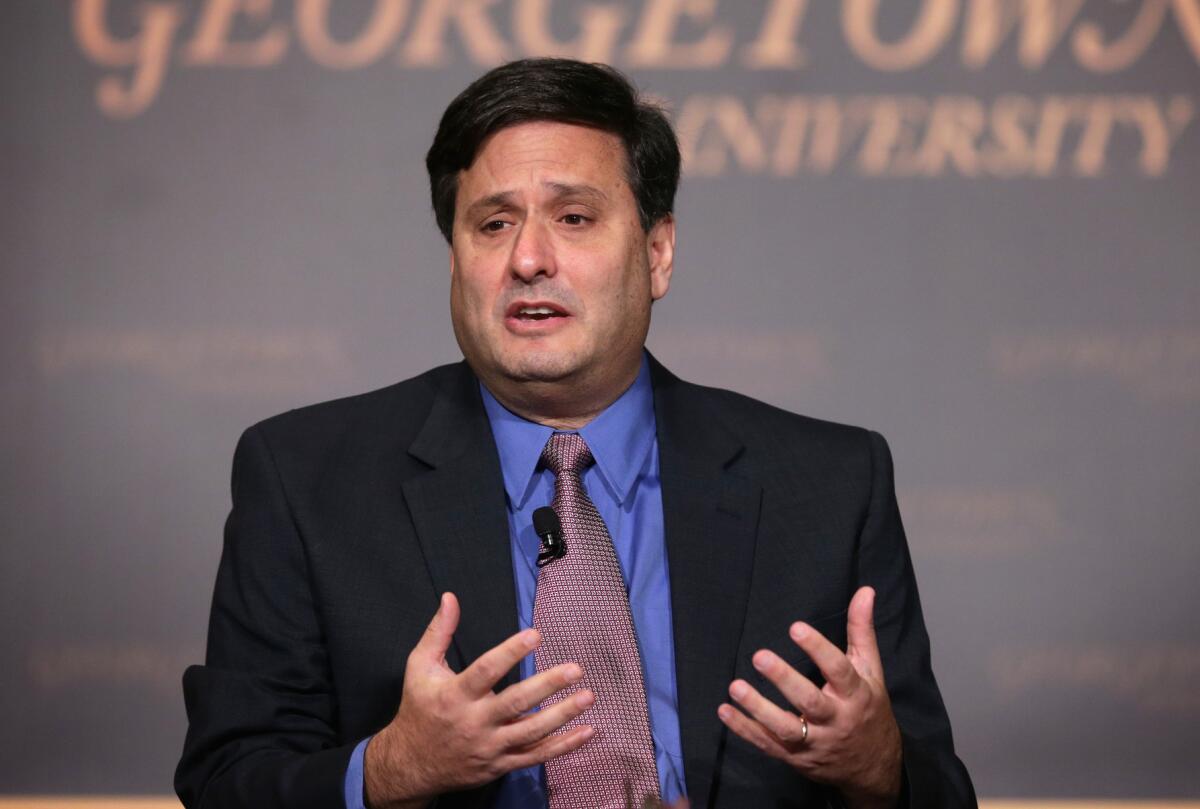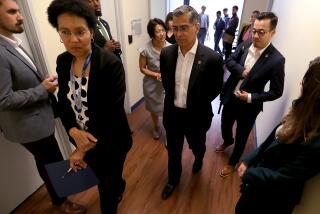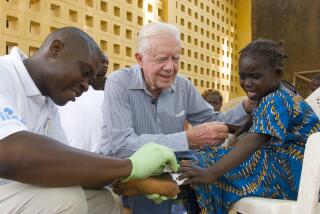Ebola ‘czar’ urges Congress to authorize emergency funding

- Share via
Reporting from Washington — The Ebola outbreak can only be successfully contained if the U.S. takes the lead and provides funding to fight the deadly virus at home and in West Africa, the man tapped to coordinate the federal government’s response to the disease said Friday.
“In this case, America has to lead, and it has led,” said Ron Klain, the nation’s Ebola “czar,” reiterating the administration’s appeal for more money from Congress to fight the disease.
Klain called on lawmakers to pass an emergency spending request put forth by President Obama that would authorize $6.18 billion for domestic readiness as well as efforts on the ground in West Africa. Of that amount, $1.54 billion would be used as reserve funding in case of a resurgence of the disease or a worsening outbreak in the United States.
Klain said that though U.S. efforts have had an effect in fighting the outbreak, dedicated funds need to be set aside for recurrences, even as public attention in this country has drifted from the threat.
“No one, a year ago, had Ebola response in their budgets,” he said during a talk at Georgetown University alongside Dr. Anthony Fauci, director of the National Institutes of Health. “Those resources are running out. The only way we can keep up the response -- let alone expand it -- is to get this emergency funding request.”
Both men said that in addition to stopping the current outbreak, increased funding could have a significant effect on devastated healthcare systems in West Africa and other parts of the world where insufficient or nonexistent healthcare can exacerbate the spread of disease.
“If something good comes out of this, it is a realization that if you do not have a minimum modicum of healthcare infrastructure, how vulnerable you are to so many things,” Fauci said.
More than 17,000 people are now infected with Ebola in West Africa, according to the World Health Organization, and more than 6,000 people have died. Though cases have slowed in Liberia, they have jumped in neighboring Sierra Leone and moderately increased in Guinea, the WHO said.
Klain noted the deaths of other patients from medical complications, including malaria, because doctors have been overwhelmed by the Ebola outbreak.
The federal government’s response to the epidemic accelerated after a Liberian man visiting the United States became the first person to die of the disease in this country. Later, two nurses who treated the man were hospitalized with the virus, but they recovered. Since then, an American doctor returning from Guinea has also recovered from the virus, but a surgeon from Sierra Leone who was transferred to an American hospital has died.
Klain, who has been criticized by Republicans for his lack of medical experience, said he was tapped for the job because of his experience handling complicated projects involving multiple government agencies. He said the Ebola response was particularly challenging because it involved multiple layers of government, including state departments of health and local hospitals.
“I never feel as un-czar-y as when I’m trying to deal with this complicated patchwork of federal, state and local systems,” he told the audience.
Five U.S. airports that handle much of the incoming traffic from Ebola-stricken countries now screen for the virus, and state health departments have established 21-day monitoring programs for travelers returning from West Africa. This month, the Department of Health and Human Services announced that 35 hospitals across the country had established Ebola treatment wings, saying that 80% of returned travelers at risk for Ebola infection now live within 200 miles of a designated hospital.
More than 3,000 U.S. personnel are also active in West Africa, focused on building treatment centers and conducting training and testing.
Fauci said the public’s response to the disease has calmed as more information about the nature of the outbreak was made available. He said it reminded him of the panic over HIV/AIDS in earlier decades, when he was a lead researcher into the disease.
“Fear is a raw emotion,” he said. “I saw it in spades in the HIV/AIDS epidemic. We go through risks every day of our lives ... but you don’t like a new risk even if you are living with many, many risks.”
Twitter: @mtthnsn
More to Read
Sign up for Essential California
The most important California stories and recommendations in your inbox every morning.
You may occasionally receive promotional content from the Los Angeles Times.










